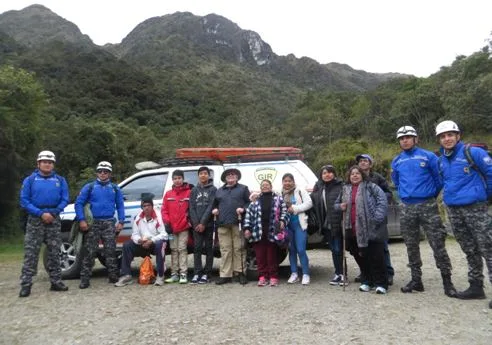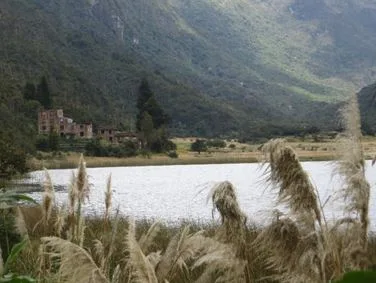How the police took me away to El Cajas park
By Jean McCord
The Cuencano couple and I sat in the back seat of a police crew cab pickup on the way to El Cajas National Park. Two National Police officers took the front seats. I got a laugh when I joked that everyone would think we civilians were in custody.
Nine police officers, all members of GIR — Grupo de Intervención y Rescate — drove three trucks to take nine civilians to the Laguna Toreadora entrance at about 13,000 feet elevation. The road from the highway to the ranger station was of fitted round stones — beautiful, but also bumpy. An ambulance and paramedic waited in the parking lot, just in case. The rest of our group consisted of a middle-aged couple, a mother with two teenage sons, a small woman. perhaps in her 50s, who moved quickly along the trail with a younger woman, possibly her daughter, and a middle-aged man who called all the officers “capitan.” I was the only gringa, and by far the oldest one on the hike.

All the civilians and almost half the police
Jeanne’s Periodico had publicized the outing as “Montaña Segura,” an easy-access walk organized by the Policía Nacional for seniors, disabled persons, and others 12 and older. At 74, I definitely fall in the senior category. I’d wanted to see El Cajas other than from a car and I’m not really up to leaping around the park’s more strenuous areas. It sounded perfect to me.
This August was the first time the local National Police chapter organized such treks, but they hope to do it again next year. They didn’t explain why they’re offering the free trips, but I suspect it’s to provide a friendly way for civilians and police to interact. A detailed and very helpful e-mailed set of guidelines (and Brian Buckner’s recent articles on hiking in Ecuador) helped me prepare. I followed every recommendation — so much that I wore two long underwear bottoms as well as one long underwear top and a fleece shirt, and I loaded my day pack with a couple liters of water, extra clothing layers, nuts, and fruit. The pack was heavy. The sun shone and I was warm, while most of the Cuencanos were cold. Three civilians brought light packs, one woman carried a heavy purse, and the rest were unencumbered until an officer handed everyone a couple of Gala apples and ham-and-cheese sandwiches before we left Cuenca.
I was glad I took my trekking poles. The trail was relatively easy, with some level paths and with boardwalks over marshy and rugged areas, but it also included 20-inch steps, tree roots, and rocks that might have sent me ass over teakettle despite the helpful young men. Altitude didn’t seem to be a big problem for me, although my heart pounded, I certainly panted a lot, and I suspect my face was neon red as we climbed to a covered boardwalk passageway on the rough hillside.
At my age, police officers always look young, but this group seemed especially young to me, several evidently in their 20s and the oldest just maybe approaching 40. As they chatted, they projected a sense of competence and seemed very dedicated to their real jobs of rescuing people in danger. None was formal with us. I have no idea of anyone’s rank, as all wore blue jackets over the shirts that bore their insignia. Our driver — and tour guide — was simply Cristián. The other officer in our car was Sebastián. And the one who wore reflective sunglasses, carried my day pack, and made sure I didn’t fall, was Jefferson.
The officers and civilians joked a lot, all in Spanish of course. I’ve never been more grateful that I’m getting fairly fluent. A large dead bird lay close to the trail at one point and three officers went to check it out. “Save it,” someone called out, and one officer told another to give it mouth-to-beak resuscitation.

Laguna la Toreadora and brewery ruins
A few buildings, rock walls, and the looming ruins of a large brewery gave evidence of what existed before the park was created in 1977 and became a national park in 1996.
After rounding the narrow end of the lake, we climbed among dwarf forest trees, including some polylepis, or paper trees, with their peeling bark. I’d never seen them close up and evidently neither had the Ecuadorian civilians, judging from their exclamations and comments. I mentioned the large number of what I thought were bromeliads and Jefferson corrected me. They were all orchids. Those in the depths of the cloud forest weren’t blooming but I saw red and maroon and orange orchids in sunnier areas as we drove out of the park.
Brown and white wild llamas grazed in the distance of the glacier-carved valley. Two large ones took turns watching us, ready to warn the herd to flee if we appeared dangerous. Later, as we approached the end of the trek, all-white domesticated llamas just beyond the park boundary didn’t seem to notice us at all.
We chanced upon a small free-roaming white horse as we entered and left the trail. Several staked-out horses were also in the park, but we encountered no other mammals except one friendly dog (a wild dog — perro sylvestre — I suggested, and got a laugh, while someone else insisted that it was domesticated and got a bigger laugh) and several small groups of hikers who passed us going in the other direction.
Not many birds flitted through the open páramo areas on this sunny day. I recognized none except swallows. Later, at a small building just before we left the lake, I noticed a fuzzy nest hanging next to an empty light socket. The tiny bird that flew out right over my head set my heart pounding again. Several people told me its name, but I didn’t understand or remember it.

Our unofficial entertainment
Three times when we took a rest the youngest woman broke into songs that everybody but me knew. Everyone clapped along. Later I asked who she was and if the police had especially invited her to entertain us. A woman answered, “She’s just one of us, a Cuencana.” The officer said she evidently liked to perform.
I was glad I went alone instead of asking a friend to go with me. If I’d gone with another gringo we would have spoken English together and not mingled; instead, I had a real Ecuadorian experience with Ecuadorians. All were friendly and laughed with me instead of at me.
My only real regret is that because I was slower than most and more concerned about falling, I couldn’t take time to look at everything in as much detail as I would have liked. That and the fact that I was exhausted by the time I got home and had to nap on and off the rest of the day. Oh, and that I had to ice my aching body for the next few days.





















